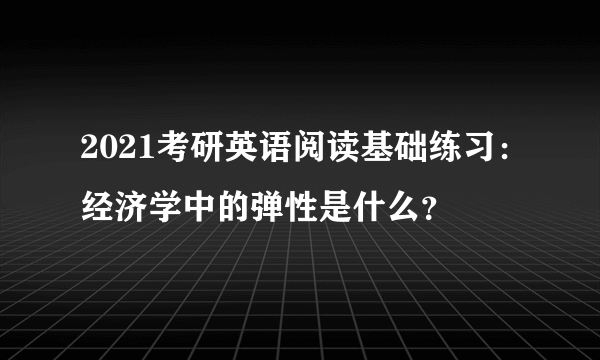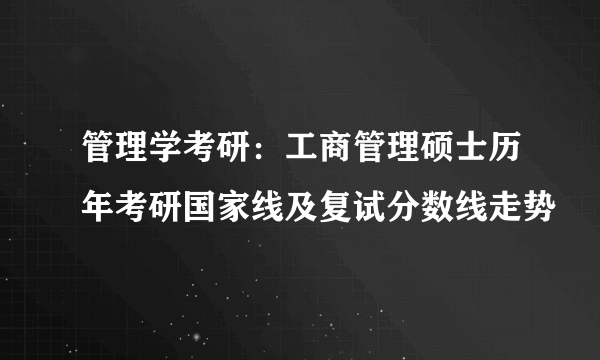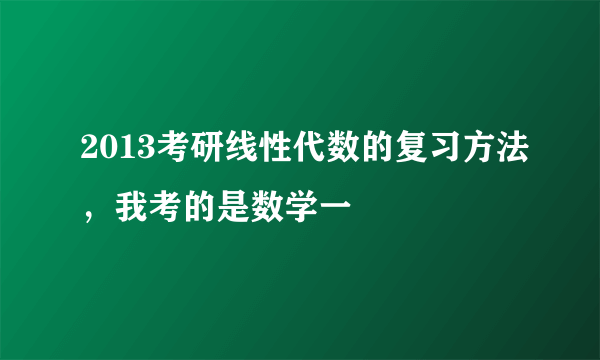2021考研英语阅读基础练习:经济学中的弹性是什么?
的有关信息介绍如下:
对于考研英语差的同学,一定要先做好英语复习规划,把功夫下早,把阅读基础打夯实 ,跟随中公考研小编一起了解一下"2021考研英语阅读基础练习:经济学中的弹性是什么?"相关内容吧~
Elasticity is a term used a lot in economics todescribe the way one thing changes in a givenenvironment in response to another variable thathas a changed value.
弹性是经济学中经常使用的一个术语,用来描述在给定环境中一个变量相对于另一个变量发生一定比例改变的属性。
For example, the quantity of a specific product soldeach month changes in response to themanufacturer alters the product's price.
例如,每个月销售的特定产品的数量随着厂商改变产品的价格而变化。
A more abstract way of putting it that means pretty much the same thing is that elasticitymeasures the responsiveness of one variable in a given environment to a change in anothervariable, which in this instance is a change in price.
更为抽象的说法,弹性衡量的是给定环境中一个变量对另一个变量变化的响应性,在这个例子中是价格变化。
Or you could also say it measures "the sensitivity" of that variable.
或者你也可以说它测量了这个变量的“灵敏度”。
Often, e conomists speak of a demand curve, where the relationship between price and demandvaries depending upon how much or how little one of the two variables is changed.
通常,经济学家说的是需求曲线,即价格和需求之间的关系取决于两个变量中的一个变化了多少。
Some Examples of Elasticity and Inelasticity
弹性和非弹性的一些例子
It's not surprising when a manufacturer substantially increases a product's price, that consumerdemand should diminish.
当制造商大幅度提高产品价格时,消费者的需求就会减少,这不足为奇。
Many common items, such as aspirin, are widely available from any number of sources.
许多常见物品,如阿司匹林,可以从许多来源广泛获得。
In such cases, the product's maker raises the price at its own risk -- if the price rises even alittle, some shoppers might stay loyal to the specific brand -- at one time, Bayer nearly had alock on the U.S. aspirin market -- but many more consumers would probably seek the sameproduct from another manufacturer at the lower price.
在这种情况下,厂商提高价格就会有自己的风险——如果价格小幅上涨,一些消费者可能仍然会忠于特定的品牌——拜耳一度几乎占有了美国阿司匹林市场——但是更多的消费者可能会以较低的价格从其他厂商那里寻找相同的产品。
In such instances, the demand for the product is highly elastic and such instances e conomistsnote a high sensitivity of demand.
在这种情况下,对产品的需求是高度弹性的,经济学家注意到了需求的高度敏感性。
But in other instances, the demand is not elastic at all.
但在其他情况下,需求根本不具有弹性。
Water, for example, is usually supplied in any given municipality by a single quasi-governmental organization, often along with electricity.
例如,在任何特定的城市,水通常由一个单一的准政府组织供应,通常与电力一起供应。
When something consumers use daily, such as electricity or water, has a single source, thedemand for the product may continue even as the price rises -- basically, because the consumerhas no alternative.
当消费者日常使用的东西(比如电或水)只有唯一一个来源时,即使价格上涨,对产品的需求也还是会继续的,因为消费者们基本没有其他选择。
Interesting 21st Century Complications
有趣的21世纪并发症
Another strange phenomenon in price/demand elasticity in the 21st century has to do withthe Internet.
21世纪价格/需求弹性的另一个奇怪现象与互联网有关。
The New York Times has noted, for instance, that Amazon often changes prices in ways that arenot directly responsive to demand, but rather to the ways consumers order the product -- aproduct that cost X when initially ordered may be filled at X-plus when reordered, often whenthe consumer has initiated automatic re-ordering.
例如,《纽约时报》指出,亚马逊经常以不直接响应需求而是响应消费者订购产品的方式来改变价格——某种产品首次订购时成本为X,当消费者开始主动回购时,再次订购时的成本就变为X+了。
The actual demand, presumably, hasn't changed, but the price has.
实际需求可能没有发生变化,但是价格已经改变了。
Airlines and other travel sites commonly change the price of a product based on an algorithmicestimation of some future demand, not a demand that actually exists when the price ischanged.
航空公司和其他旅游网站通常会根据对未来需求的估计来改变产品价格,而不是依据价格改变时实际存在的需求。
Some travel sites, USA and others have noted, put a cookie on the consumer's computer whenthe consumer first inquires about the cost of a product; when the consumer checks again, thecookie raises the price, not in response to a general demand for the product, but in responseto a single consumer's expression of interest.
美国和其他一些旅游网站指出,当消费者首次查询产品的价格时,会在消费者的电脑上储存一个cookie;当消费者再次查看时,cookie会提高价格,这不是反映产品的普遍需求,而是反映了单个消费者的兴趣。
These situations do not at all invalidate the principle of price elasticity of demand. Ifanything, they confirm it, but in interesting and complicated ways.
这些情况根本不会使需求的价格弹性原则失效。如果说有什么不同的话,那就是他们以有趣而复杂的方式证实了这一点。
In summary:
综上所述:
Price/demand elasticity for common products is generally high.
普通产品的价格/需求弹性通常很高。
Price/demand elasticity where the good has only a single source or a very limited number ofsources is typically low.
当商品只有单一来源或来源数量非常有限时,价格/需求弹性通常很低。
External situations may create rapid changes in the price elasticity of demand for almost anyproduct with low elasticity.
外部环境可能会导致几乎所有低弹性产品的需求价格弹性的快速变化。
Digital capabilities, such as "demand pricing" on the Internet, can affect price/demand in waysthat were unknown in the 20th century.
数字能力,例如互联网上的“需求定价”,可以以20世纪未知的方式影响价格/需求。
How to Express Elasticity as a Formula
如何用公式表达弹性
Elasticity, as an economics concept,can be applied to many different situations, each with itsown variables. In this introductory article, we've briefly surveyed the concept of the priceelasticity of demand. Here's the formula:
弹性,作为一个经济学概念,可以应用到许多不同的情况,每种情况都有自己的变量。在这篇文章中,我们简要介绍了需求价格弹性的概念。以下是需求价格弹性的公式:
Price Elasticity of Demand (PEoD) = (% Change in Quantity Demanded/ (% Change in Price)
需求价格弹性( PEoD ) = ( 需求量变化的百分比/ (价格变化的百分比)
以上是中公考研为同学们整理的"2021考研英语阅读基础练习:经济学中的弹性是什么?"相关内容,考研英语,阅读是重点,这部分的分值较大,考生一定要把握住,希望各位考生能够在小编整理的这篇文章中收获到知识点,更多考研英语阅读理解内容尽在中公考研英语阅读频道~
相关阅读:
2021考研英语阅读解题技巧——命题点
2021考研英语阅读题型解析---英语二新题型
2021考研英语:英语阅读入门指导



